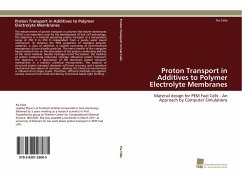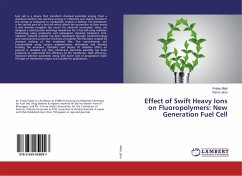The enhancement of proton transport in polymer electrolyte membranes (PEM) is an important issue for the development of fuel cell technology. The objective is a material providing proton transport at a temperature range of 350 K to 450 K independent from a purely water based mechanism. To enhance the PEM properties of standard polymer materials, a class of additives is studied consisting of functionalised mesoporous silicon dioxide particles. The main interest of the computer based research lies on the description of the proton conducting abilities of the novel material. Besides hydrogen bond fluctuation, the mobility of proton conducting molecules strongly influences proton transport. The objective is a description of the dominant proton transport mechanisms in a realistic chemical environments. The analysis of structural proton transport demands sufficient accuracy and a quantum mechanical description of reactions, whereas the chemical environment is influenced on larger scales. Therefore, different methods are applied, namely classical force field and density functional based tight binding.







